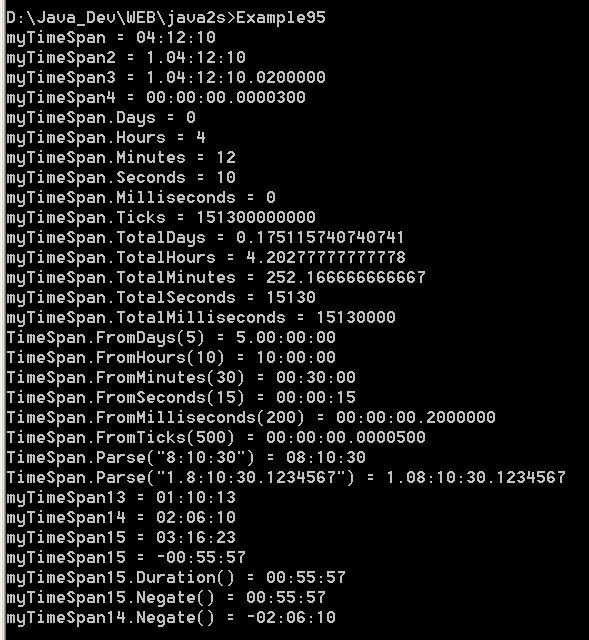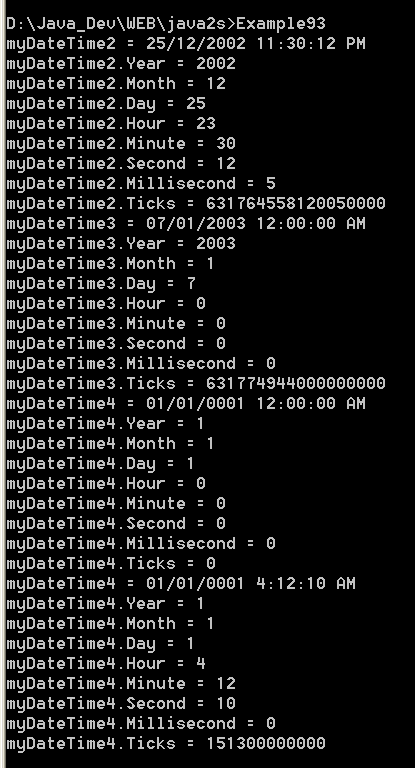illustrates the use of TimeSpan properties and methods

/*
Mastering Visual C# .NET
by Jason Price, Mike Gunderloy
Publisher: Sybex;
ISBN: 0782129110
*/
/*
Example9_5.cs illustrates the use of TimeSpan properties and methods
*/
using System;
public class Example9_5
{
public static void DisplayTimeSpan(
string name, TimeSpan myTimeSpan
)
{
Console.WriteLine(name + " = " + myTimeSpan);
// display the TimeSpan's properties
Console.WriteLine(name + ".Days = " + myTimeSpan.Days);
Console.WriteLine(name + ".Hours = " + myTimeSpan.Hours);
Console.WriteLine(name + ".Minutes = " + myTimeSpan.Minutes);
Console.WriteLine(name + ".Seconds = " + myTimeSpan.Seconds);
Console.WriteLine(name + ".Milliseconds = " +
myTimeSpan.Milliseconds);
Console.WriteLine(name + ".Ticks = " + myTimeSpan.Ticks);
}
public static void Main()
{
// create a TimeSpan instance, specifying the hours, minutes,
// and seconds
int hours = 4;
int minutes = 12;
int seconds = 10;
TimeSpan myTimeSpan = new TimeSpan(hours, minutes, seconds);
Console.WriteLine("myTimeSpan = " + myTimeSpan);
// create a TimeSpan instance, specifying the days, hours, minutes,
// and seconds
int days = 1;
TimeSpan myTimeSpan2 = new TimeSpan(days, hours, minutes, seconds);
Console.WriteLine("myTimeSpan2 = " + myTimeSpan2);
// create a TimeSpan instance, specifying the days, hours, minutes,
// seconds, and milliseconds
int milliseconds = 20;
TimeSpan myTimeSpan3 =
new TimeSpan(days, hours, minutes, seconds, milliseconds);
Console.WriteLine("myTimeSpan3 = " + myTimeSpan3);
// create a TimeSpan instance, specifying the number of ticks
long ticks = 300;
TimeSpan myTimeSpan4 = new TimeSpan(ticks);
Console.WriteLine("myTimeSpan4 = " + myTimeSpan4);
// display the properties for myTimeSpan
Console.WriteLine("myTimeSpan.Days = " +
myTimeSpan.Days);
Console.WriteLine("myTimeSpan.Hours = " +
myTimeSpan.Hours);
Console.WriteLine("myTimeSpan.Minutes = " +
myTimeSpan.Minutes);
Console.WriteLine("myTimeSpan.Seconds = " +
myTimeSpan.Seconds);
Console.WriteLine("myTimeSpan.Milliseconds = " +
myTimeSpan.Milliseconds);
Console.WriteLine("myTimeSpan.Ticks = " +
myTimeSpan.Ticks);
Console.WriteLine("myTimeSpan.TotalDays = " +
myTimeSpan.TotalDays);
Console.WriteLine("myTimeSpan.TotalHours = " +
myTimeSpan.TotalHours);
Console.WriteLine("myTimeSpan.TotalMinutes = " +
myTimeSpan.TotalMinutes);
Console.WriteLine("myTimeSpan.TotalSeconds = " +
myTimeSpan.TotalSeconds);
Console.WriteLine("myTimeSpan.TotalMilliseconds = " +
myTimeSpan.TotalMilliseconds);
// use the FromDays(), FromHours(), FromMinutes(), FromSeconds(),
// FromMilliseconds(), and FromTicks() methods to create new
// TimeSpan instances
TimeSpan myTimeSpan5 = TimeSpan.FromDays(5);
Console.WriteLine("TimeSpan.FromDays(5) = " +
myTimeSpan5);
TimeSpan myTimeSpan6 = TimeSpan.FromHours(10);
Console.WriteLine("TimeSpan.FromHours(10) = " +
myTimeSpan6);
TimeSpan myTimeSpan7 = TimeSpan.FromMinutes(30);
Console.WriteLine("TimeSpan.FromMinutes(30) = " +
myTimeSpan7);
TimeSpan myTimeSpan8 = TimeSpan.FromSeconds(15);
Console.WriteLine("TimeSpan.FromSeconds(15) = " +
myTimeSpan8);
TimeSpan myTimeSpan9 = TimeSpan.FromMilliseconds(200);
Console.WriteLine("TimeSpan.FromMilliseconds(200) = " +
myTimeSpan9);
TimeSpan myTimeSpan10 = TimeSpan.FromTicks(500);
Console.WriteLine("TimeSpan.FromTicks(500) = " +
myTimeSpan10);
// use the Parse() method to convert strings to TimeSpan instances
TimeSpan myTimeSpan11 = TimeSpan.Parse("8:10:30");
Console.WriteLine("TimeSpan.Parse(\"8:10:30\") = " +
myTimeSpan11);
TimeSpan myTimeSpan12 = TimeSpan.Parse("1.8:10:30.1234567");
Console.WriteLine("TimeSpan.Parse(\"1.8:10:30.1234567\") = " +
myTimeSpan12);
// use the Add() method to add a TimeSpan instance to another
TimeSpan myTimeSpan13 = new TimeSpan(1, 10, 13);
TimeSpan myTimeSpan14 = new TimeSpan(2, 6, 10);
TimeSpan myTimeSpan15 = myTimeSpan13.Add(myTimeSpan14);
Console.WriteLine("myTimeSpan13 = " + myTimeSpan13);
Console.WriteLine("myTimeSpan14 = " + myTimeSpan14);
Console.WriteLine("myTimeSpan15 = " + myTimeSpan15);
// use the Subtract() method to subtract a TimeSpan instance
// from another
myTimeSpan15 = myTimeSpan13.Subtract(myTimeSpan14);
Console.WriteLine("myTimeSpan15 = " + myTimeSpan15);
// use the Duration() method to add two TimeSpan instances
Console.WriteLine("myTimeSpan15.Duration() = " +
myTimeSpan15.Duration());
// use the Negate() method to add two TimeSpan instances
Console.WriteLine("myTimeSpan15.Negate() = " +
myTimeSpan15.Negate());
Console.WriteLine("myTimeSpan14.Negate() = " +
myTimeSpan14.Negate());
}
}
Related examples in the same category
| 1. | Current date and time | | |
| 2. | What day of the month is this? | | |
| 3. | Do some leap year checks | | |
| 4. | Look at the min and max date/time values | | |
| 5. | Output DateTime object | | |
| 6. | Constructors of DateTime | | |
| 7. | comparisons between DateTime objects | | |
| 8. | Parse and ParseExact | | |
| 9. | DateTime Now and its calculation | | |
| 10. | new DateTime(1900, 2, 29) | | |
| 11. | new DateTime(1900, 2, 29, new JulianCalendar()) | | |
| 12. | Specify Kind DateTime | | |
| 13. | Offset of DateTime | | |
| 14. | DateTime and TimeSpan Instances | | |
| 15. | use the Now and UtcNow properties to get the currrent date and time | | |
| 16. | display the Date, Day, DayOfWeek, DayOfYear,Ticks, and TimeOfDayProperties of myDateTime | | |
| 17. | use the Compare() method to compare DateTime instances | | |
| 18. | use the overloaded less than operator (<) to compare two DateTime instances | | |
| 19. | use the Equals() method to compare DateTime instances | | |
| 20. | use the DaysInMonth() method to retrieve the number of days in a particular month and year | | |
| 21. | use the IsLeapYear() method to determine if a particular year is a leap year | | |
| 22. | use the Parse() method to convert strings to DateTime instances | | |
| 23. | use the Subtract() method to subtract a TimeSpan from a DateTime | | |
| 24. | use the overloaded subtraction operator (-) to subtract a TimeSpan from a DateTime | | |
| 25. | Illustrates the use of DateTime and TimeSpan instances | |  |
| 26. | Displays the words 'Hello World!' on the screen, along with the current date and time | |  |
| 27. | A simple clock | |  |
| 28. | Estimates pi by throwing points into a square. Use to
compare execution times | |  |
| 29. | Change current culture and back | | |
| 30. | How values you passed into contructor mapped to its Properties | | |
| 31. | Gets the day of the week | | |
| 32. | Returns the number of days in the specified month and year. | | |
| 33. | DateTime and == | | |
| 34. | Create a DateTime structure with local time | | |
| 35. | Compare DateTime instance with Equal methods | | |
| 36. | Format a DateTime with M/dd/yyyy h:mm:ss.fff tt | | |
| 37. | Check the Kind of DateTime | | |
| 38. | DateTimeFormatInfo.CurrentInfo.TimeSeparator | | |
| 39. | Initializes a DateTime structure to a specified number of ticks. | | |
| 40. | DateTime.Now, DateTime.UtcNow, DateTime.Today | | |
| 41. | Parse a date time value from a string with Invariant Culture | | |
| 42. | Default value of DateTime is DateTime.MinValue | | |
| 43. | Default ToString output | | |
| 44. | Convert DateTime to string with fr-FR culture | | |
| 45. | ToString single letter format: F | | |
| 46. | DateTime ToString single letter format with fr-FR culture | | |
| 47. | DateTime Compare | | |
| 48. | DateTime CompareTo | | |
| 49. | Gets the date component of this instance. | | |
| 50. | Time String | | |
| 51. | Create day and year for a certain month | | |
| 52. | Returns the number of seconds since January 1, 1970 | | |